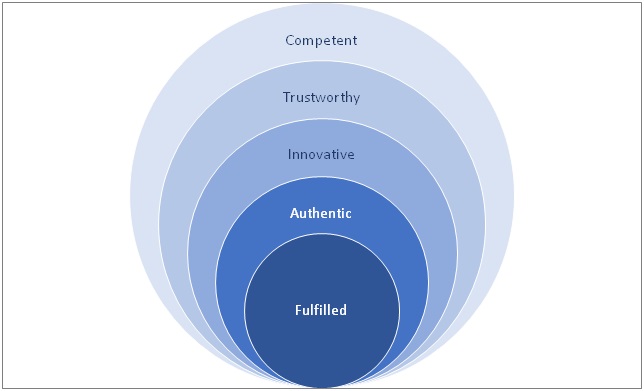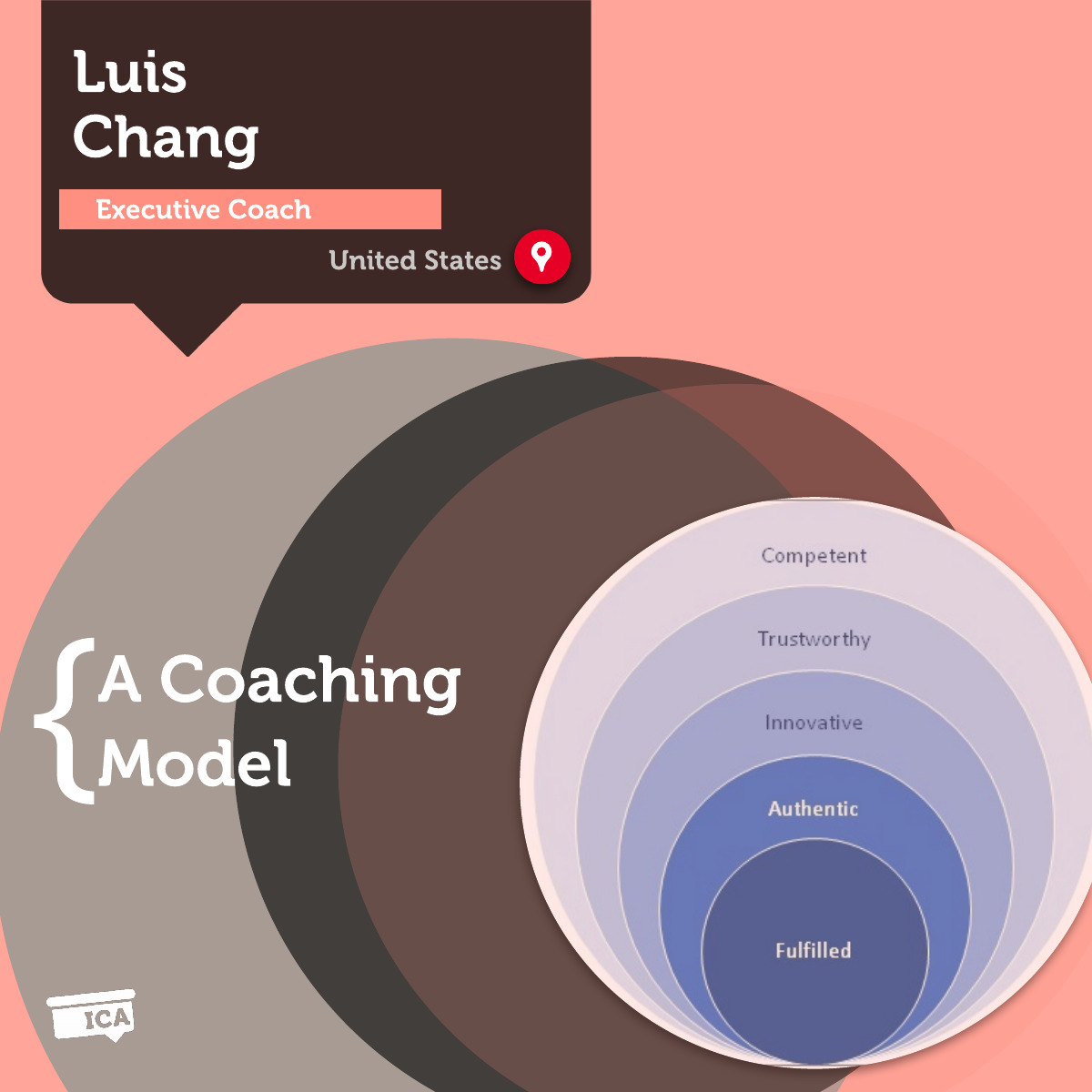A Coaching Model By Luis Chang, Executive Coach, UNITED STATES
5 Aspects of Satisfactory Life
As an executive and leadership coach-to-be, I would like to build a model that covers and explores areas of competencies, skills, abilities, and strengths that are critical for satisfactory and successful work life and a fulfilled personal life.
This model can be summarized in the following proposed slogan:
Graph 1. A Proposed Slogan

And can be represented in the following graph:
Graph 2. Areas of Strengths for a Coaching Model

The first three areas of strengths and abilities (the outer circles of the graph: be competent, trustworthy, and innovative) are fundamental for success at work; the fourth area (be authentic) explores the relationship of the client’s performance at work with their life aspirations, and the last area focuses on how satisfied with life the client is and can be.
- Be Competent. The very basic set of strengths indispensable to succeed at work is to be competent at what you do, that is, to bring the technical, professional, or scientific knowledge and the required experience and expertise to the workplace or the hiring organization to perform the best possible job. At this level of analysis, the focus is on the qualifications of the coachee as an expert. Without their expertise or knowledge, a professional or worker would hardly be hired. And this includes trainees who join organizations to be trained but bring some knowledge and attributes to contribute to the hiring organizations’ work.
- Be Trustworthy. A professional’s knowledge or expertise is certainly not enough for them to succeed at work. Soft skills, that is, people’s abilities to communicate with each other and work well together, are essential and highly required by most employers and study centers. According to Omnia Group, the 7 essential soft skills are leadership skills, teamwork, communication skills, problem-solving skills, work ethic, flexibility/adaptability, and interpersonal skills[1]. All soft skills make a professional trustworthy and someone appreciates at work.
Values also play a paramount role in building a professional’s or a worker’s trustworthiness. Honesty and integrity, responsibility, and punctuality are at the basis of someone’s reputation as highly reliable. Imagine finding that a colleague or your boss lied to you once, and you know that most probably you will hardly trust them again.
And a track record of consistently delivering good results adds to a professional’s trustworthiness.
- Be Innovative. You can be a highly knowledgeable and trustworthy employee or executive, but in today’s ever-changing environment, you need to use your creativity to provide innovations at work. With so much fierce competition in the market, complacency can put a company or organization out of business, and the only way to go ahead is to innovate.
Some coachees may think that they are not creative enough, an underlying belief that has to be challenged, as we are all endowed with the ability to see things from novel angles, find new ways of doing things, or provide new solutions to old and new problems.
- Be You/Authentic. This area focuses on how aligned the client’s values and sense of purpose are with their career path and performance. Is he or she living up to their values and beliefs at work? Does their job provide meaning to their lives? Do they feel they are building something or are they just performing well to earn money? By excelling at work, is the client pursuing what they want in life?
- Be Fulfilled. This area explores how satisfied the client is with his/her life. How is their work/life balance? How is their family life? How about their friendships? Do they often see their family members and friends? What are they grateful for? Do they follow healthy life habits like doing physical exercise regularly, meditating/practicing mindfulness, and getting enough sleep? What are their aspirations in life? Do they have a sense of purpose they are pursuing? How do they see themselves at the end of their lives?
This model is certainly a simplification of the complex reality of the different aspects that help a client be successful at work and pursue a satisfactory life but provides tools to help the coach focus on critical areas to explore and probe.
Learn How to Create Your Own Coaching Model
Your Coaching Model reflects your values,
philosophies and beliefs and must communicate who you will coach
and the problems you will solve.
References
[1] Omnia Group, “The 7 Soft Skills You Need to Be Successful”, by Keather Snyder https://www.omniagroup.com/the-7-soft-skills-you-need-to-be-successful/
